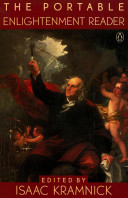Definition of a Philosophe
Reason is to the philosopher what grace is to the Christian.
Grace causes the Christian to act, reason the philosopher.
Other men are carried away by their passions, their actions not being preceded by reflection: these are the men who walk in darkness. On the other hand, the philosopher, even in his passions, acts only after reflection: he walks in the dark, but by a torch.
The philosopher forms his principles from an infinity of particular observations. Most people adopt principles without thinking of the observations that have produced them: they believe that maxims exist, so to speak, by themselves. But the philosopher takes maxims from their source; he examines their origin; he knows their proper value, and he makes use of them only in so far as they suit him.
Truth is not for the philosopher a mistress who corrupts his imagination and whom he believes is to be found everywhere; he contents himself with being able to unravel it where he can perceive it. He does not confound it with probability; he takes for true what is true, for false what is false, for doubtful what is doubtful, and for probable what is only probable. He does more, and here you have a great perfection of the philosopher: when he has no reason by which to judge, he knows how to live in suspension of judgment
The philosophic spirit is, then, a spirit of observation and exactness, which relates everything to true principles: but the philosopher does not cultivate the mind alone, he carries his attention and needs further. Our philosopher does not believe in exiling himself from this world, he does not believe that he is in enemy country; he wishes to enjoy with wise economy the goods which nature offers him; he wishes to find pleasure with others, and in order to find it. he must make it: thus he tries to be agreeable to those with whom chance and his choice have thrown him, and at the same time he finds what is agreeable to him. He is an honest man who wishes to please and to make himself useful.
The majority of the great, whose dissipations do not leave enough time to meditate, are savage towards those whom they do not believe to be their equals. The ordinary philosophers who meditate too much, or rather who meditate badly, are savage towards everybody: they flee men, and men avoid them. But our philosopher who knows how to strike a balance between retreat from commerce with men, is full of humanity. He is Terence’s Chrémés[1] who feels that he is a man, and that humanity alone is interested in the good and bad fortune of his neighbor. Homo sum, humani a me nihil olienum puto. [I am a man, nothing human is foreign to me. ]
It would be useless to remark here how jealous the philosopher is of everything calling itself honor and probity. Civil society is, so to speak, a divinity for him on earth; he burns incense to it, he honors it by probity, by an exact attention to his duties, and by a sincere desire not to be a useless or embarrassing member of it. The sentiments of probity enter as much into the mechanical constitution of the philosopher as the illumination of the mind. The more you find reason in a man, the more you find in him probity. On the other hand, where fanaticism and superstition reign, there reign the passions and anger. The temperament of the philosopher is to act according to the spirit of order or reason: as he loves society extremely, it is more important to him than to other men to bend every effort to produce only effects conformable to the idea of the honest man.
This love of society, so essential to the philosopher, makes us see how very true was the remark of Marcus Aurelius: “How happy will the people be when kings are philosophers or philosophers are kings!”
Notes:
Quoted in its entirety, this short essay capture the full essence of what it means to be an Enlightenment Scholar, to study the world and cherish civilization as sacred above all else.
Folksonomies: enlightenment philosophy
Taxonomies:
/science/social science/philosophy (0.506578)
/law, govt and politics/government (0.327332)
/religion and spirituality (0.243717)
Keywords:
philosopher (0.966644 (positive:0.297554)), short essay capture (0.823571 (neutral:0.000000)), honest man (0.804462 (positive:0.677635)), nihil olienum puto (0.801252 (neutral:0.000000)), probity enter (0.735391 (neutral:0.000000)), men (0.729855 (positive:0.060683)), Philosophe Quoted (0.726809 (neutral:0.000000)), cherish civilization (0.725331 (positive:0.536843)), Enlightenment Scholar (0.719949 (neutral:0.000000)), proper value (0.710961 (positive:0.282632)), particular observations (0.709832 (neutral:0.000000)), philosophic spirit (0.707605 (positive:0.275007)), ordinary philosophers (0.707443 (neutral:0.000000)), enemy country (0.707066 (negative:-0.379222)), great perfection (0.706605 (positive:0.489307)), Homo sum (0.704589 (negative:-0.208677)), Terence’s Chrémés (0.704407 (neutral:0.000000)), superstition reign (0.703805 (negative:-0.370990)), wise economy (0.703656 (neutral:0.000000)), embarrassing member (0.701875 (negative:-0.247983)), Marcus Aurelius (0.701790 (positive:0.723123)), true principles (0.701562 (positive:0.354715)), reason (0.698523 (positive:0.518913)), bad fortune (0.697951 (neutral:0.000000)), Civil society (0.696599 (neutral:0.000000)), mechanical constitution (0.695853 (neutral:0.000000)), exact attention (0.695675 (neutral:0.000000)), passions (0.681889 (neutral:0.000000)), maxims (0.650266 (neutral:0.000000)), grace (0.647558 (positive:0.664049))
Entities:
Grace:Person (0.799682 (positive:0.664049)), Marcus Aurelius:Person (0.581284 (positive:0.723123)), Terence:Person (0.535754 (neutral:0.000000))
Concepts:
Mind (0.966778): dbpedia | freebase | opencyc
Philosophy (0.864037): dbpedia | freebase | opencyc
Epistemology (0.757007): dbpedia | freebase | opencyc
Debut albums (0.755453): dbpedia
Scientific method (0.714129): dbpedia | freebase
Plato (0.691647): dbpedia | freebase | opencyc | yago
Psychology (0.625263): dbpedia | freebase | opencyc
Religion (0.524088): dbpedia | freebase | opencyc






